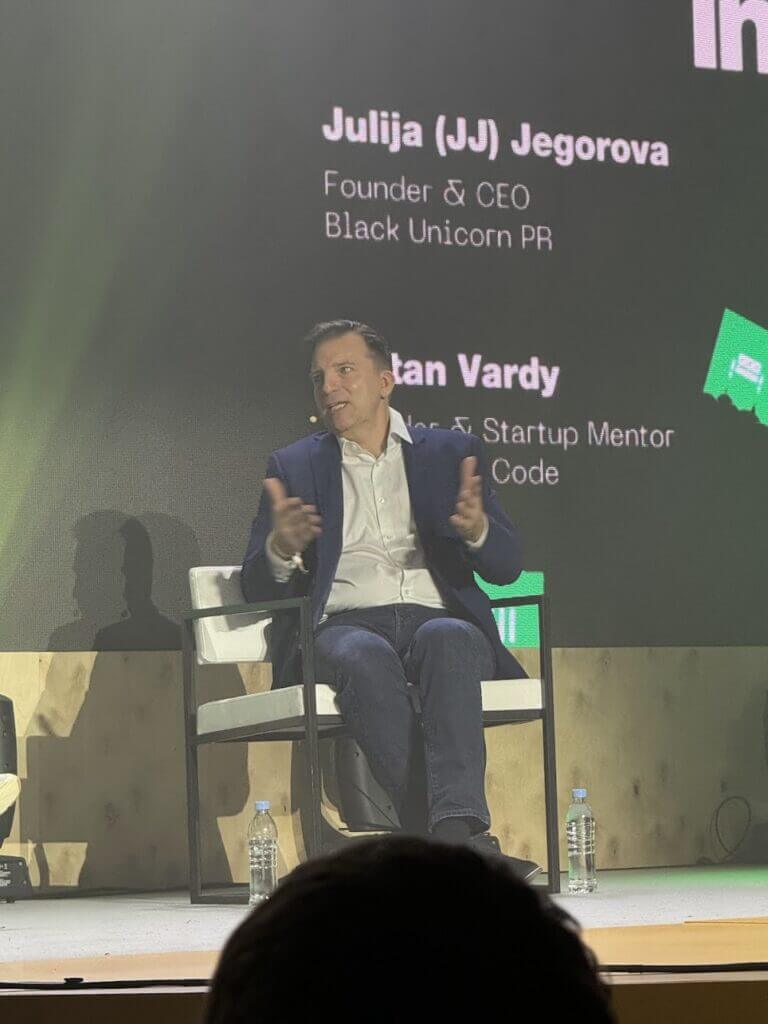On the second day of TechChill, our own JJ Jegorova interviewed Zoltan Vardy in a fireside chat to open the day’s sessions. Zoltan has been in B2B sales and executive positions for over 30 years, helping him close more than $2 billion throughout his career (damn!).
Baltic founders are known to be superheroes when it comes to B2B products. But when it comes to sales, well the word sounds a bit more like a kind of kryptonite. Good idea then to get a B2B sales expert on stage.
Even better news is that, according to Zoltan, founders who hate sales and avoid it at all costs can learn to love it. And much of that is part of an attitude change. Founders should see sales as part of the problem-solving endeavour that is building a startup, but which is often forgotten as something exclusive to product. But more on that, below.
To clarify, this is not a transcript, but an account of the conversation as seen through the eyes of a member of the audience.
Index and quick links:
Introducing Zoltan
The importance of founders in B2B sales
Zoltan Vardy’s key principles for B2B sales
Role of the founder in sales
First sales hires
What startups can do to better sell to enterprises
How startups can get a foot in the door
The art of sales
Enterprise sales and AI
Choosing initial markets and expansion territories
Wrapping up – biggest advice
Introducing Zoltan Vardy
Zoltan Vardy is a startup mentor and speaker helping B2B tech founders sell and market to enterprise clients by applying his sales & marketing blueprint called The Launch Code. The Launch Code is like a cheat code to learn faster by absorbing Zoltan’s own career learnings. It is composed of principles, tools, and techniques Zoltan used to close $2 billion in B2B sales over his 30-year global career as a C-suite executive, entrepreneur, and investor. So far, Zoltan has helped 200+ founders in 26 countries to build predictable revenue by sharing The Launch Code via a personal mentoring program, group workshops, and an on-demand course.
Zoltan was formerly Sr. VP Global Sales at NBC Universal International, and a regional CEO at Germany’s ProSiebenSat1 Media. He helped launch a dozen international media and tech businesses and has had successful exits as a founder (eEuropeMedia) and as an investor (Brainient). He also serves as chairman of enterprise loyalty SaaS technology, Antavo.
Zoltan was born and raised in the US and divides his time between London and Budapest. He’s been active for a while in CEE, and is looking closer at the Baltics after featuring in The Pursuit of Scrappiness podcast.
The importance of founders in B2B sales
Despite how great your product might be, you won’t achieve your biggest potential and possible success unless you become good at sales. In other words, “a great product doesn’t free you from the burden of sales”. However, as you’ll see further on, the key lies in transforming sales from a ‘burden’, or something stressful, into a source of excitement and fulfilment.
According to Zoltan, when a founder lacks sales experience, they tend to be one of these three:
- They rely on “if you build it they will come”, hoping that if they just build a good product and potentially blast emails to convert a percentage, they’ll be fine
- They understand selling is important, but it’s uncomfortable for them to do
- They understand selling is important, but are lacking certain skills
One of the keys to overcoming feelings of discomfort is to completely shift the mindset of how to approach sales. If products are about solving problems and satisfying needs, then selling should also centre around problem solving. A lot of founders are scared of coming off as pushy. In general, that should not be an issue if you focus on helping clients overcome pain.
Zoltan Vardy’s key principles for B2B sales
Zoltan shared three fundamental things to get right:
- Focus your offer messaging – prospects need to understand what you’re (really) offering, ideally it needs to be a single sentence that people understand
- Ensure your success with a proper strategy – for founders who didn’t work in sales before, there is a natural tendency to go “I know a guy” and “spray and pray”, but both are bad
- Create a structured environment – many founders in startups typically haven’t worked in structured sales environments like the ones you find at large corporations. They might be slower than startups, but they know what they’re doing in sales. Create structures and constantly improve them by making decisions based on data insights, not feeling.

How should the role of the founder in sales evolve as the startup grows and when should you hire a Head of Sales?
For Zoltan, the founder should remain ‘Chief Sales Officer’ indefinitely, but increasingly delegate day to day responsibilities to everyone else. Founders need to sell because the process of selling is critical to startup growth. It informs your startup about clients and their own processes. This allows you to constantly improve your own sales but also marketing and product strategy.
By conversing with the client, you can find out what works and what doesn’t for them in terms of the product, information that should be fed to product development. A good and direct feedback loop with clients helps with things like product fixes, and improvements for the next iterations.
Finally, being in front of customers helps you understand how to build your team better. Since you are solving your clients’ problems, for a moment consider yourself as an extension of your client’s team (this is what we do 😉 ) – who would you need to hire to satisfy their needs better (and avoid churn)?
What should you look out for in your first sales hires?
There are a combination of different variables that are useful to consider when hiring a salesperson. Zoltan recommends hiring someone that is adept at creating structure, as opposed to people accustomed to inheriting structure. People that thrive when given free reign to work a ‘territory’ or industry. They will be scrappy, proactive and self-motivated. So look for signs that they have done that before, or are capable of doing so. And experience is often not as important as drive and motivation.
Startups are small, new companies. Considering all the asymmetries, what can startups do to better sell to enterprises?
When selling to enterprises you’re facing someone who lives in a polar opposite world. In large companies, everything is governed by certainty. That’s why there are meetings for everything. Decision-making is slower. Legacy tech can be a bottleneck. On the other side of the coin, startups need to move fast, they hate meetings, and they can build new products in days. As Zoltan tells the TechChill crowd, if you let it, selling to enterprises can be a “car crash”.
Instead, founders should accept reality and adapt. One way is to target the right type of enterprises. For Zoltan, it’s better to go after ‘deer’ type companies at first, rather than ‘elephants’. Deers are enterprise-sized companies that are not the biggest of their kind, but they are challengers in their vertical capable of moving faster. They are more open to innovation because they are motivated by gaining market share. They will typically be private companies, and therefore more nimble than its publicly listed counterparts.
Elephants are enormous, process-driven companies with cash cow brands. They are typically too slow for a startup’s (ideal) cash flow needs. Often they are public companies that have the additional pressure of protecting their share price while needing to make lots of information about the inner workings public.
To identify the right deers, Zoltan recommends looking for innovation within their organisation. An accelerator or incubator arm is a good indication. But also look for people with titles that suggest they are keen to adopt and implement new technologies, such as “Head of Innovation”.
Another piece of advice is to be extra clear when speaking to enterprises. We spoke before about the importance of clarity in messaging. For corporations, this is extremely important. They only care about products that will help them with two things – make more money, or save money. EBITDA baby!
From a more tactical point of view, what can help startups get an initial foot in the door?
Large companies are full of decision-makers and budget holders with little time and big responsibilities. The key here lies in finding a mid-level internal champion. This will be people who have authority, more time with room for manoeuvre, and also the ear of the decision maker.
Enterprise sales can be a long process of 6-18 months, but they are big deals. Zoltan recommends keeping the champions engaged to stay informed with processes and opinions inside the target company. This is information that can eventually help close the deal (or close it faster or with better terms).
Another tip from Zoltan was to see if you identify partners who already have relationships with that prospect. They could have good contacts and be able to provide warm introductions that help kickstart the process from a place of trust. Yes, warm intros are still a thing, and that’s while we still call cold emails ‘cold’.
The art of sales
Despite all the strategy, structure, plans and contacts in the world, Zoltan highlighted that the art of sales still matters. Even if you have the right product solving the right need, often you will need to dig a bit deeper. And things can go sideways no matter what you do.
One way to thrive in sales is to leverage networks. If you don’t have a network, go out there and start building relationships! Events like TechChill are a great place to start, but Zoltan recommended turning this structured approach too.
Perception matters. In general, you need to adapt your profile so that people don’t misunderstand who you are and, better, become convinced you are the person that can help them. Position yourself as a problem-solver for the pain of your target buyer. This is something Zoltan already mentioned you should do at a company level, but which also applies to you as a person.
Do look after your online presence and reputation. Because, before (or after) you meet someone, what is the first thing they’re gonna do? Exactly, they’re going to google you or look at your LinkedIn profile. So make sure your online reputation reflects what you tell, and what people can expect you to do for them.

Sales and AI
Of course, AI is capable of producing a lot of content. But AI posts and emails are easy to spot. This impersonal or effortless approach can turn people off. In enterprise sales, high tickets mean more thorough considerations. Buyers expect personalised, tailored, well-thought approaches. Needless to say, they expect humans to be the ones communicating with them.
However Zoltan also referred to a TechChill presentation from the previous day in which a presenter advocated for AI in high velocity sales. Zoltan agreed that for certain use cases AI can be useful. However, for enterprise sales AI content is rather limited.
On how startups should choose their initial markets and expansion territories
For Zoltan, the ‘go everywhere from the start approach’ is not optimal. You have limited resources. Therefore, you need focus. So instead of going everywhere at once, first choose three markets that would be favourable based on factors like language, networks and personal interests.
To expand, once you’ve identified the next market, adopt a structured approach. Set up meetings, start networking, or even do an event. Look for partners in the market. Find companies that have networks and sell ‘through them’. Partnerships can be a huge sales channel.
Wrapping up – biggest advice
Follow the following 3 pillars
First, work on your offering message. This was mentioned before, but it’s important. Come up with a single sentence that explains what problem you solve. Ideally, it will also help bring across why you are better than the competition at this.
Second, don’t offer too many custom solutions. Find the best solution that satisfies about 80% or more of your clients and make it stand out. Zolan recommends making it the ‘middle package’ out of three main pricing options.
Third, structure your sales approach so buyers understand throughout that you are solving their pain. This is related to the mindset shift we talked about before. It will be better for the client, but most importantly for you.
How to stay updated with Zoltan Vardy’s latest
You can follow Zoltan on LinkedIn, and for more on The Launch Code, check out his website.
Also check out:
Black Unicorn PR’s impressions of TechChill 2024
The definitive guide to European startup events in 2024
Want more content to help grow your startup with PR, marketing and more? Check out our posts on:



